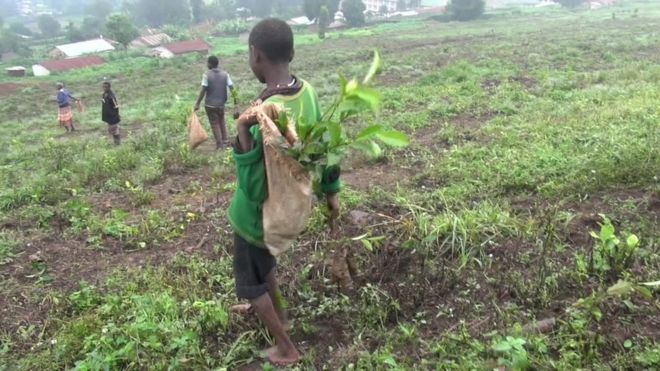
During his November visit to Africa, the continent which now counts nearly 200m Roman Catholics, Pope Francis said that children were some of the greatest victims of Africa's historical exploitation by other powers. He also urged young Africans to resist corruption. But should the Vatican be doing more to put its own house in order? A BBC investigation has uncovered evidence that church land in Uganda is being used for child labour.
Alex Turyaritunga has first-hand experience of child exploitation, albeit of a more extreme kind.
"I was a child soldier, nothing can take that away from my memory," he tells the BBC. "I remember the war in 1994. I had a gun around my shoulder."
Today, Mr Turyaritunga is a nurse with the UN refugee agency (UNHCR) in Uganda.
He was raised in Kabale, a town nestled in the hills of south-west Uganda. Standing on the hillside, children play in Rwandan schoolyards on the other side of the steep inclines of Kabale.
But in the mid-1990s, during the time of the Rwandan genocide, it was the sound of war that echoed across the border.
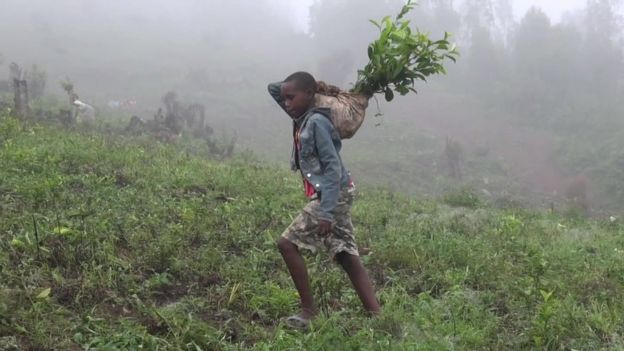
After the death of his father when he was a young child, he says that he was lost and without direction until members of the Catholic Church helped his mother pay for his education and that of his four siblings.
"They helped me be what I am today," he says.
Now, aged 32, Mr Turyaritunga's view on the Catholic Church has changed.
Earlier this year, Mr Turyaritunga made allegations to the BBC about child labour taking place on Church-owned land in Kabale.
He alleged that children as young as 10 were working on a tea plantation on the land, and that the Catholic Church was profiting.
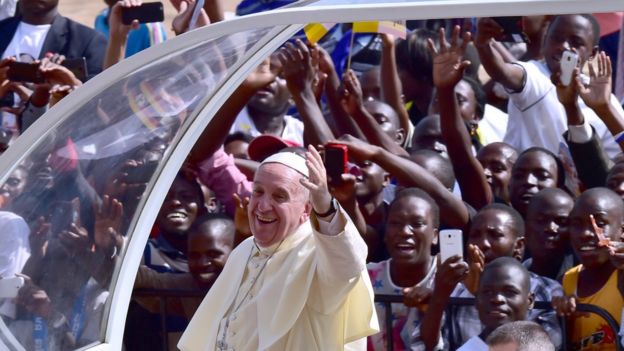 AFP
AFP
Child labour is without doubt a big issue in Uganda, where the UN estimates that there are three million child workers. The latest figures estimate that 30% of children aged between five and 14 are engaged in child labour, despite 14 being the earliest age where it is legal for a child to work.
When we arrived in Kabale, we were introduced to a supervisor at the enterprise who spoke to us on the condition that we kept his identity secret.
The supervisor told us that children did work on the farm.
Their pay ranged from 1,000 Ugandan shillings (20p; $0.30) to 2,000 Ugandan shillings per day.
The supervisor said that the land was owned by the Roman Catholic Church but it was in business with the supervisor's employer: Kigezi Highland Tea Limited.
When the BBC team visited the farm there were up to 15 children working along with adults from the local community.
Their work consisted of gathering young tea plants stacked at the bottom of a steep hill and carrying them up the steep hill to the location of the desired point of cultivation. Children were also tasked with weeding the rows of tea plants.
In an effort to determine exactly who owned the plantation, we went to the local land registry and sought proof that the land belonged to the Church.
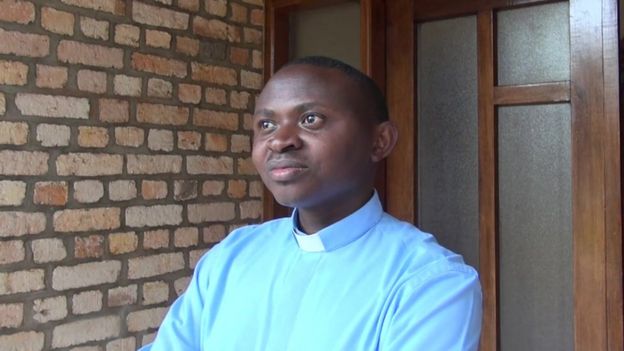
A local Catholic Church official confirmed to us that there had been "a business deal between the diocese and Kigezi Highland Tea" since 2013.
The official said that the decision to harvest tea came "through the financial sustainability plan committee" of the diocese.
Repeated attempts by the BBC to contact Kigezi Highland Tea Limited over the allegations went unanswered.
Armed with a copy of the land deeds, we decided to put our findings to Bishop Callistus Rubaramira, of the Catholic diocese of Kabale.
Just outside his residence, on Church property, we came across more children, one of whom was 10 years old, unloading tea seedlings from a truck. They were preparing for the next day's work.
When we asked them their age, one responded: "10 years". They laughed together, before returning to work.
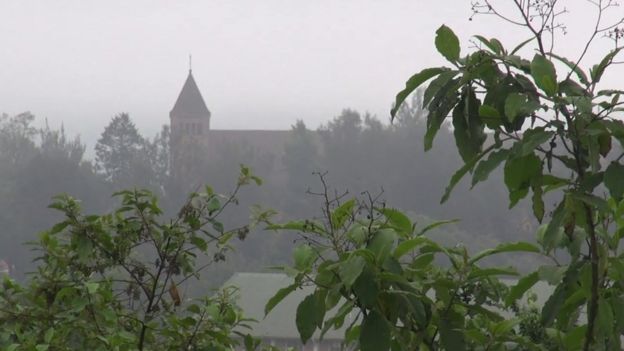
Children aged 10 working for a business run by both a church and corporation highlights the complexity of what Pope Francis calls an "authentic plague" on children of the world.
When we tried to contact the Bishop in his diocese, we were told that he was preparing to meet the pope. Calls to his mobile also went unanswered.
Father Lucien, his secretary, denied that child labour was taking place on the tea plantation.
So we called the Vatican instead and put our evidence to the Pope's spokesman, Federico Lombardi.
"I deny to have responsibility and duty to answer about this - if there is problem for the local church, I am not responsible for that", he told us.
Mr Turyaritunga, the one-time child soldier turned nurse and now whistleblower, believes child labour is a problem for the Church's highest office to solve.
"Child labour damages children psychologically," he says. "I feel the Vatican should wake up and revise the business policy of the Catholic Church - or else there is going to be danger."
He says that business and the Catholic Church should not mix without proper oversight.
"I feel at this time the Catholic Church is not ready for business," he says. "That's why I am calling for policy reform.
"And I know this policy reform will transform the community very well, because we will have no child abuse, we will have no child labour."



No comments:
Post a Comment